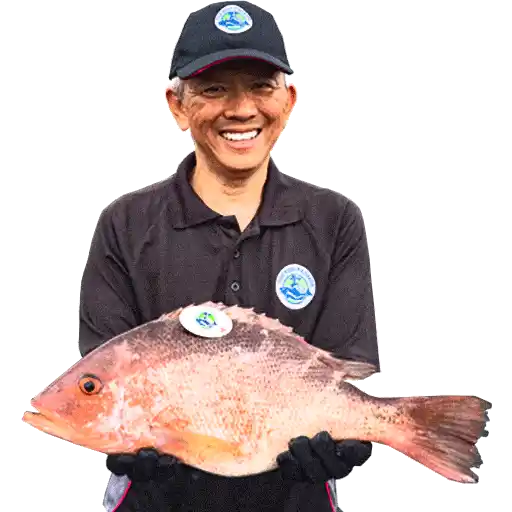
Sustainability
What sustainability means
Importance of sustainability
Threats to sustainability
Technology for Sustainability
Pillars of Food Security
Availability
Availability
Maintaining a consistent, diverse, and sufficient food supply to meet the nutritional needs of the population, fostering stability, and mitigating potential shortages or crises.
Access
Access
Provide all individuals with consistent and equitable availability of safe and nutritious food, promoting well-being, and mitigating hunger and malnutrition.
Utilization
Utilization
Food Security in Singapore

The Fish Farmer adheres to our value of sustainability by following two measures: farming and sourcing from sustainable sources.
We integrate technology on our farm to increase produce output and ensure that we are farming sustainably.
On the importing and exporting front, we try to import products from sustainable sources as much as possible. Our team engaged DNV for their consultation service to ensure we comply with the Marine Stewardship Council (MSC) Chain of Custody (CoC) standards.
Today we are certified by the MSC CoC standards.
Malcolm Ong


With over a decade of experience in shrimp farming, Blue Aqua has developed a keen understanding on the processes and challenges in the industry.
As such, Blue Aqua has developed a Mixotrophic system which they hold a patent to. Our proprietary Mixotrophic methodology is designed to support super-intensive shrimp farming. This method of farming increases yield and contributes to sustainability.
The is no discharge of waste water in the Mixotrophic system as compared to the traditional practice of water exchange in shrimp farming. Hence, it is a greener way to farm shrimp.
Erika Chong

FAQ
Singapore encourages local food production through a multifaceted approach. Investments in agricultural innovation and technology, financial incentives, and subsidies support local farmers.
The government promotes sustainable farming practices, integrates agriculture into urban planning, and allocates land for agricultural use. Public awareness campaigns educate citizens about the benefits of locally sourced food. Farmers’ markets provide a direct avenue for producers to connect with consumers.
Training programs enhance farmers’ skills, while partnerships with research institutions drive advancements in agriculture. Local sourcing policies, regulatory support, and a focus on food security collectively contribute to Singapore’s efforts to build a resilient and sustainable local food ecosystem.
Singapore prioritizes water sustainability in agriculture through innovative strategies. The use of reclaimed water, NEWater, reduces reliance on conventional sources, while water-efficient irrigation systems and precision farming minimize wastage.
Research focuses on developing drought-resistant crops and efficient cultivation methods. Vertical farming methods, including hydroponics, maximize yields with minimal water usage. Agricultural water recycling and smart water management technologies enhance efficiency. Educational programs raise awareness, and government incentives encourage the adoption of water-efficient practices.
Rainwater harvesting and pricing mechanisms further support responsible water use. Collaboration fosters the sharing of best practices, collectively fostering a more resilient and sustainable agricultural water ecosystem in Singapore.
Singapore promotes sustainable seafood consumption through initiatives including certification from organizations like MSC and ASC, clear labeling, and traceability.
Public awareness campaigns and seafood guides educate consumers about responsible choices. Government collaborations with international organizations and strict import regulations ensure compliance with sustainability standards. Financial support incentivizes businesses to adopt eco-friendly practices, and ongoing research supports sustainable aquaculture technologies.
Partnerships with retailers and restaurants encourage the availability of certified seafood, and consumer engagement platforms provide information for informed choices. Stakeholder engagement fosters collective efforts to maintain a responsible and environmentally friendly seafood supply chain in Singapore.
Stability in food security refers to the consistent and reliable access to sufficient, safe, and nutritious food for all individuals within a population or community over time.
It implies that food availability, accessibility, utilization, and stability in access remain relatively steady, minimizing the risks of hunger and malnutrition.
A stable food security situation is characterized by the absence of significant fluctuations or disruptions in the food supply chain, allowing individuals and communities to meet their dietary needs without facing regular or unexpected challenges, such as food shortages, price volatility, or inadequate access to nutrition. Stability in food security is a key goal for sustainable and resilient food systems.
Communities can enhance local food security through diverse strategies. Initiatives such as community gardens, farmers’ markets, and CSAs promote local agriculture and direct consumer-producer connections. Educational programs on sustainable farming, waste reduction, and nutrition empower residents.
Community meal programs foster shared resources, and food cooperatives reduce costs. Advocacy for local food policies and collaboration with organizations strengthen the overall food resilience of the community. Waste reduction efforts, partnerships, and support for food entrepreneurs contribute to sustainability.
Community-led food assessments identify specific needs, guiding targeted interventions for a more resilient and equitable local food system.
Technology is integral to ensuring food security by enhancing efficiency and sustainability. Precision agriculture utilizes sensors and drones for resource optimization, while biotechnology develops resilient, high-yield crops. Smart irrigation and digital farming platforms provide real-time data, empowering farmers.
Blockchain ensures transparency and traceability in the supply chain.
Vertical farming, big data analytics, and robotics streamline production processes, while climate-smart agriculture adapts to changing conditions.
Mobile banking aids financial inclusion, and aquaculture technologies promote sustainable fish farming. Food preservation innovations and remote sensing technologies further contribute to a resilient and technologically advanced food system, vital for meeting global demands.
Climate change significantly jeopardizes global food security. Altered weather patterns, extreme events, and rising temperatures disrupt traditional growing seasons, leading to reduced crop yields and increased food price volatility. Sea-level rise and water scarcity threaten coastal agriculture.
Changing disease patterns and pests pose risks to crops and livestock. Infrastructure disruptions impact food distribution and supply chains. Economic impacts, especially on vulnerable populations, intensify food access challenges. Biodiversity loss affects crucial agricultural ecosystems, while smallholder farmers face heightened vulnerability.
Addressing climate change’s impact on food security requires both mitigation and adaptation strategies, emphasizing international cooperation and sustainable agricultural practices.
Individuals can enhance food security by minimizing food waste through practical steps. Meal planning, proper storage, and understanding expiry dates prevent unnecessary discards. Portion control and creative cooking with leftovers reduce excess.
Freezing perishables and donating surplus food contribute to sustainability. Composting kitchen scraps lessens landfill waste. Smart shopping and reusing packaging promote responsible consumption. Conscious dining out, educating others, and utilizing technology for inventory tracking foster waste reduction. Supporting local food recovery programs and engaging in community initiatives redirect surplus food to those in need.
These individual actions collectively contribute to a more sustainable food system.


